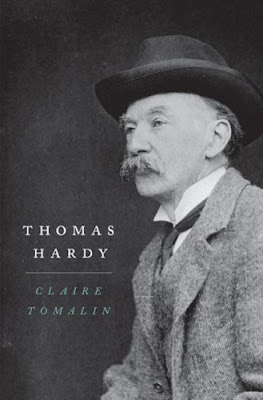Thomas Hardy
Claire Tomalin
Published 2006
English Biography
⭐⭐⭐⭐⭐
It was amazing that I found this biography at a used bookstore because Hardy is one of my favorite writers.
Claire Tomalin's undertaking of this biography is well written and meticulously researched, captivating from cover to cover. In addition, I believe she was fair in her narrative of the author. I mean, I believe she was; then again, this is the only Hardy biography I have read.
The book is sectioned into chronologically ordered periods of Hardy's life, beginning with his mother. She was a "modern woman" with personal aspirations until she became pregnant with Hardy -- and out of wedlock, no less. He possibly made her unhappiness his lifetime burden, which may have contributed to his "moods of black depression."
But his mother also enlightened him on the plight of women and mothers and could be the reason he portrayed a feminist sympathy in his writing.
Some other tidbits about my favorite writer:
Hardy's Young Life
Hardy appreciated music, loved poetry and words, and was 'a born bookworm.'
He did not want to grow up, and had a boyish crush on his teacher.
He was exposed to humanism and lost his faith in Christianity.
He was full of contradictions, especially about religion.
He wanted to be a poet, but needed to write novels to make an income.
He did want to become a serious novelist, and his best novels are great works of imagination, each with its own seam of poetry sewn into the narrative. Even his minor novels are wonderful oddities, amusing, disquieting, distinctive.
Hardy as a Novelist
His first novel was rejected numerous times, but he sought to learn from that rejection.
When he began to have a successful writing career, his works were imaginative and paid detailed attention to natural history.
Hardy's imagination may have gone too far as he began to explore dark ideas.
Again, the contradictions: Tomalin points out that Hardy experienced a long, happy, well-rewarded life; and yet, he never expressed why he had a "black view of life." But it could have been the company he kept with those who had bleak worldviews.
Tomlin pointed out that Hardy was not always correct about life. She described reading Jude "like being hit in the face over and over again." (Pretty good description.)
And she quoted Hardy's friend, who asked:
What has Providence done to Mr. Hardy that he should rise up in the arable land of Wessex and shake his fist at his Creator?
His novels were "his own summary of his experience of life" (though I would say it stemmed more from a blind ungratefulness of blessings right before his eyes).
Hardy and Women
He married his long time romantic interest, Emma, a free spirited woman.
Emma's parents and Hardy's parents did not approve of the marriage.
Emma and Hardy were never able to have children, and it may have contributed to the rift in their relationship, among other things.
Emma and Hardy were a contradiction as a couple. Eventually, they drifted apart.
Hardy fell in love with younger women. (I told you: he never wanted to grow up.)
He definitely developed an emotional affair with a much younger woman, Florence.
He hated to be alone...even if he had to be in the house with Emma.
Emma died, and Hardy grieved; he wrote poems about her, which annoyed Florence. Ugh.
He still hid his relationship with Florence, but eventually secretly married her.
And then there was another much younger woman that he obsessed after. By now he was bordering on "dirty old man." Poor Florence.
Hardy as a Poet
After several successful novels, which brought him financial liberty, he focused entirely on his poetry, which added to his fame and success.
Hardy's Idolatry
Tomalin discussed Hardy's idolatry: It was Tess! No kidding! Like a god, he created Tess, his idol.
Marcel Proust echoed Hardy's view of love, who believed: "the lover creates an image of the beloved in his mind that may bear little resemblance to the read person." And furthermore:
Few people understand the subjective nature of love and the way it creates another being, different from the actual person bearing the same name, and endowed with characteristics for the most part imaged by the lover...Desire arises, satisfies itself and disappears - that's all there is to it. So the young woman you marry is not the person you fell in love with.
A Disappointing End
On his deathbed, he asked Florence to read the Gospel account of Christ's birth, and when she finished reading, he remarked that there was not a gain of evidence that the Gospel was true.
I thought there would be a chance he return to the faith of his youth, but alas...
I never let a day go without using a pen. Just holding it sets me off; in fact, I can't think without it. ~ Thomas Hardy
Nonetheless, this biography was quite engaging and fulfilling. Also, it was such a pleasure to read Claire Tomalin's work that I will look for other biographies written by her in the future.

No comments:
Post a Comment
Share your thoughts...